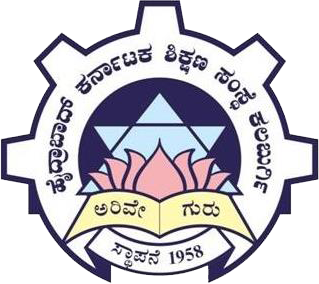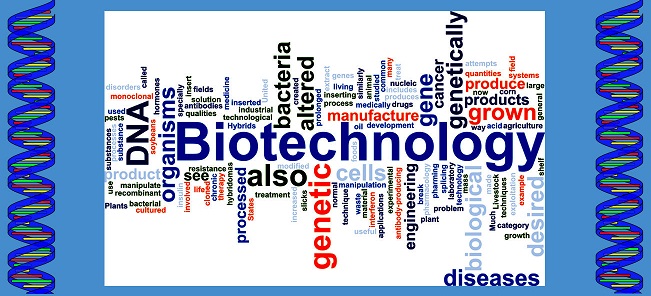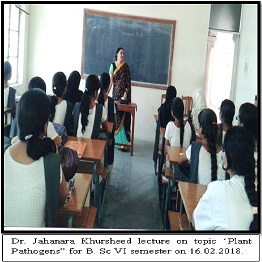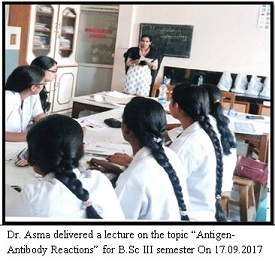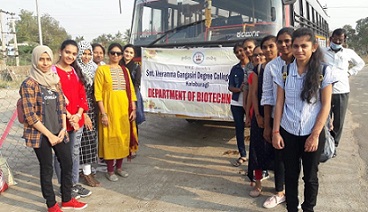Biotechnology
Science
DEPARTMENT PROFILE
Establishment
The Department of Biotechnology established in the year October 1994, offers a three year Under Graduate level Program with an intake of 20 students assisted by University Grants Commission (UGC) under H.K.E. Society’s Smt. Veeramma Gangasiri Degree College for Women, Kalaburagi. The Department inauguration was done by Dr. Rudrayya, the then Vice-Chancellor, Gulbarga University, Gulbarga; Dr. B. G. Jawali was the President of H. K. E. Society.
Vision
To provide Quality Education and to develop competent Biotechnologists for the welfare of society. Students can employ premium processes and applications which will profoundly influence existing paradigm of agriculture, industry, healthcare and restoration of environment providing sustainable competitive edge to societal benefits.
Mission
- To regularly update the students, catering to the needs of academia and industry.
- To emphasize the recent trends in Biotechnology through workshops and seminars.
- To inculcate students with in-depth knowledge of research aspects.
- To realize full potential of Biotechnology.
- Enhance efficiency skills of students and to make them build socio-economic consciousness and uplift their ideas towards improvement of the area of their interests.
Aim
The Department of Biotechnology came into existence as one of the independent Department of Biological Sciences in Smt. Veeramma Gangasiri Women’s Degree College with a vision to be a leading biotechnology department that imparts quality education with strong research oriented technical skills and components on various branches of Biotechnology.
About Biotechnology
Biotechnology is regarded as one of the most important disciplines, a thrust area for its effective implementation at undergraduate level as a first degree vocational course. It is also considered as task force in generating self-employment and employment avenues. Biotechnology has emerged as a driving force not just for the exploration of Biological Sciences but also the Physical Sciences, Chemical Sciences and Informational Technology.
Biotechnology is the use of living organisms for human benefits. By this definition, Biotechnology would date back to the very beginnings of civilization, when humankind first learned to cultivate crops and domesticate animals in a system of agriculture. When one thinks of Modern Biotechnology was revolutionized when scientists first learned how to isolate and clone genes, allowing for genetic engineering.
Today, the biotechnology industry has grown and expanded to affect us on a day-to-day basis. As such the knowledge at the under- graduate level of such an important and an applied subject has greater justification of orienting of our young generation towards a meaningful future, is a valuable legacy that a society can leave behind.
With this background the Department of Biotechnology at Under-graduate level has been imparting knowledge of Biotechnology for serving the cause of education of the people of this region in particular and the nation at large.
TEACHING STAFF
| S.No | Name of the Faculty | Designation | Photo | Qualification | Profile Link |
|---|---|---|---|---|---|
| 1 | Smt. Mangala Biradar | Lecturer | 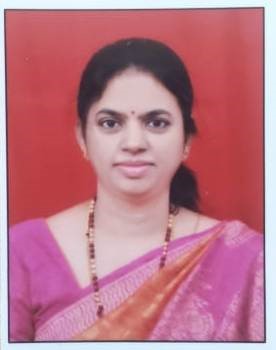 |
M.Sc Microbiology | view profile |
Courses & Syllabus
Under-graduate Curriculum
The department functions on the lines drawn by the UGC and Karnataka State Women University, Vijayapura in the form of syllabus. Following are the disciplines/ areas involved in Teaching/Learning Biotechnology, where it is taught as one of the optional subject along with Chemistry and Botany.
The course consists of six semesters introduced from 2007-2008
- I Semester : Cell Biology and Cytogenetics
- II Semester : Biochemistry
- III Semester : Microbiology and Immunology
- IV Semester : Molecular Biology
- V Semester : Genetic Engineering (I), Plant and Animal Biotechnology (II paper)
- VI Semester : Agriculture and Environmental Biotechnology (III) and Industrial and Medical Biotechnology(IV)
Program : B. Sc (Biotechnology)
Subject Combination: Non NEP : Biotechnology, Botany, Chemistry
Subject Combination: NEP : Biotechnology, Botany
Syllabus Of Non NEP Biotechnology Course from I to VI Sem
Research
List of research equipments:
| S.No | EQUIPMENTS IN DEPARTMENT | No. |
|---|---|---|
| 1 | PCR Thermal Cycler | 01 |
| 2 | Polyacrylamide Gel Electrophoresis(PAGE) | 01 |
| 3 | Orbital Shaker | 01 |
| 4 | Cold Centrifuge | 01 |
| 5 | Laminar Air Flow | 01 |
| 6 | pH Meter | 01 |
| 7 | Deep Freezer | 01 |
| 8 | UV Spectrophotometer | 01 |
| 9 | UV Illuminator | 01 |
| 10 | Centrifuge | 01 |
| 11 | Inclined Mono-ocular Microscopes | 12 |
| 12 | Electrophoresis Unit | 01 |
| 13 | Micropipettes | 03 |
| 14 | Autoclave | 01 |
| 15 | Water bath | 01 |
| 16 | Incubator | 16 |
| 17 | BOD Incubator | 01 |
| 18 | Weighing Balance | 01 |
| 19 | Refrigerator | 01 |
| 20 | Microwave oven | 10 |
| 21 | Stage Micrometer | 02 |
| 22 | Ocular Micrometer | 01 |
Activities
i) BOS/ BOAE members:
| Sl. No | Name of the Faculty | BOS | BOAE | BOE |
|---|---|---|---|---|
| 1 | Dr. Sumangala Deshmukh | 02 | 01 | 02 |
| 2 | Dr. Sharada Beknal | 03 | 02 | 04 |
| 3 | Smt. Shilpa Bandrad | 03 | 02 | 02 |
| 4 | Dr. Renuka Rampure | 03 | 02 | 03 |
| 5 | Dr. Basavarajeshwari Avanti | 02 | 02 | 03 |
NAAC/ IQAC related workshops/ conferences/etc attended :
| Name of the Seminar/Conference/Symposia/Workshop/Webinar | Name of the sponsoring agency | Date and Place |
|---|---|---|
| One Day National Conference on “NAAC : A Road Ahead” | SB College of Commerce & Science, Kalaburagi | 20-04-2018, SB College of Commerce, Kalaburagi |
| One Day Workshop on “New Modalities of IQAC/NAAC” | College IQAC | 08-09-2018, MSI Degree College of Arts, Science & Commerce, Kalaburagi |
| Two Day “Professional Development Training Program for Teachers” | College IQAC | 30-10-2018, 31-10-2018, Smt. VG Degree College & PG Centre for Women, Kalaburagi |
| Two Day National Seminar on “Sensitization of Changing Perspectives in NAAC Assessment & Accreditation Process” | NAAC Bengaluru & College IQAC | 13-09-2019 to 14-09-2019, Smt. VG Degree College for women |
iv) Value added courses details –
| Link to Value Added Course | Course details | Duration | Course conducted |
|---|---|---|---|
| View Report of Value Added Course – Bioinformatics | Certificate course in Bioinformatics | 1st March to 30th March 2019 | For final year BBC, CBZ and MCZ combination. |
| View Report of Value Added Course – Cultivation of Mushroom | Certificate course in Cultivation of Mushroom | 5th of July to 3rd of Aug 2017 | B.Sc III & V sem students of Biotech Combination. |
v) Bridge Course:
Bridge course in Biotechnology conducted by the Department at the beginning of the academic year is an effort on our part to fill-in the chasm that exists between the shared knowledge of students at the entry-level and the course requirements. The duration of the course was 15 days. The objective of the Bridge Course is to provide adequate foundation in the core applied science subject so that students do not face any difficulty when the classes commence. During this interaction of few days with the faculty, the Students will come out of their hesitation and it will be the best platform for the Students to interact with the faculty members, making it responsible for them to build strong relationships with faculty and other fellow Students.
Syllabus for the bridge course: View Bridge Course Syllabus
Time table of the bridge course: View TimeTable of the Bridge Course
List of students attended the Course: View List
Bridge course has produced an insight to the Biotechnology Course which Students will be undertaking in the further 3 year duration. It was an interactive online class taken by the Department to ease the newly joined Students to the new and vast subject of Biotechnology.
vi) Teacher Exchange List:
| Sl. No | Name of the Teacher | College/Institution | Topic | Date | Class |
|---|---|---|---|---|---|
| 1 | Dr. Asma | Bi. Bi. Roza College, Kalaburagi. | Antigen-Antibody Reactions | 17.09.2017 | B.Sc III semester |
| 2 | Dr. Jahanara Khursheed | Bi. Bi. Roza College, Kalaburagi | Plant Pathogens | 16.02.2018 | B. Sc VI semester |
vii) Projects/ Field work/ Internships list: Visit to Chincholi Forest and Chandrampalli Dam with Botany Department.
| Sl. No. | Academic Year | B.Sc I | B.Sc II | B.Sc III | Total Strength |
|---|---|---|---|---|---|
| 1 | 2017-18 | 30 | 32 | 21 | 83 |
| 2 | 2018-19 | 19 | 30 | 31 | 80 |
| 3 | 2019-20 | 20 | 18 | 30 | 68 |
| 4 | 2020-21 | 20 | 18 | 18 | 56 |
| 5 | 2021-22 | 16 | 20 | 18 | 54 |
| 6 | 2022-23 | 27 | 16 | 19 | 62 |
List of the students for the Academic year 2017-18
Course,Program & Program Specific Outcome
Course Outcomes:
Cell Biology
-This course presents the types and structural details of the basic unit by which all the living things are made of (the cell). Goals: To make the student to understood the concept of cell and their activities. This course presents the types and structural details of the basic unit by which all the living things are made of (the cell). Goals: To make the student to understood the concept of cell and their activities.
Biochemistry –
This course presents the chemical reactions or metabolic functions in the living system and their regulations. Goals: To make the student to understood the concept of biochemical regulations Objectives: On successful completion of the subject the student should have understood basic structure and metabolism of Biomolecules.
Microbiology
-This course presents the utility of microbes. Goals: To make the student to understood the applications of microbes Objectives: On successful completion of the subject the student should have understood: Fermentation, Microbial products, Vaccine and antibiotics.
Immunology
– This course presents the basic defense mechanism of animals Goals: To make the student to understood the concept immunology Objectives: On successful completion of the subject the student should have understood: Immunity, Antigen, Antibody, Cells of immune system and their function and regulations.
Molecular Biology
– This course presents the genetics at molecular level Goals: On successful completion of the subject the student should have understood the molecular aspects of genetic.
Genetic Engineering
-This course presents the genetics at molecular level Goals: On successful completion of the subject the student should have understood the molecular aspects of genetics.
Plant Biotechnology
-This course presents the application of Plants in Biotechnology Goals: To make the student to understood usage of Plant products and exploitation of them in Biotechnology. Objectives: On successful completion of the subject, the student should have understood: Crop development, Callus culture, Biotechnological applications of plants.
Animal Biotechnology
– This course presents the application of animal Biotechnology Goals: To make the student to understood usage of Animal products and exploitation of them in Biotechnology. Objectives: On successful completion of the subject, culture, Animal tissue culture, Animal products, production & improvement of them.
Environmental Biotechnology
– This course presents the Study and the Management of the Environment Goals: To make the student to understood Ecology and Conservation of the Environment Objectives: On successful completion of the subject the student should have understood Ecosystem, energy flow and Uses and values of Biodiversity. Agricultural Biotechnology- This course presents biotechnology in agriculture, growth and historical perspective of agricultural biotechnology.
Agriculture Biotechnology – Risks and applications. Transgenic plants resistance to biotic and abiotic stress.
Medical Biotechnology
– The field of Medical Biotechnology includes research and development of technology used in the medical, agricultural and pharmaceutical industries. Medical biotechnology is the use of living cells and cell materials to research and produce pharmaceutical and diagnostic products that help treat and prevent human diseases. Most medical biotechnologists work in academic or industrial settings. Medical biotechnology is the use of living cells and cell materials to research and produce pharmaceutical and diagnostic products that help treat and prevent human diseases.
Industrial Biotechnology
– includes modern application of biotechnology for sustainable processing and production of chemical products, materials and fuels. Biotechnological processing uses enzymes and microorganisms to produce products that are useful to a broad range of industrial sectors, including chemical and pharmaceutical, human and animal nutrition, pulp and paper, textiles, energy, materials and polymers, using renewable raw materials.
Program Outcome
: BSc is one of the popular undergraduate courses that students opt for after completing their 10+2 studies. The course is usually offered by all the top notch universities across the country with different specialization. B.Sc. is an undergraduate level course offered at all the leading national and state level universities in India. Students with minimum academic qualification of class XII are eligible to purse Bachelor of Science course in different branches. Bachelor of Science (BSc) offers theoretical as well as practical knowledge about different subject areas. These subject areas include Physics, Chemistry, Mathematics and Biology and other fields depending on the specialization a student opts. Admission procedure for BSc may or may not be conducted test depending on the university and college policy. In case of no entrance exam admission in the courses is done on the basis of merit determined through marks scored in 10+2 final examinations. Career prospects- Students pursuing a degree in BSc generalcourse can apply for a job in fields such as teaching, banking and marketing.
However, it is recommended for students to pursue a master’s Program after getting their BSc degree to boost their chances of getting a better profile and higher salaried jobs in their respective fields. Science graduates can go to serve in industries or may opt for establishing their own industrial unit. After the completion of the B.Sc. degree there are various other options available for the science students. Often, in some reputed universities or colleges in India and abroad the students are recruited directly by big MNC’s after their completion of the course.
Program Specific Outcome
: Biotechnology teaches about biological sciences with engineering technologies that manipulate living organisms and biological systems to produce products that advance healthcare, medicine, agriculture, food, pharmaceuticals and environment control. Program Specific Outcome a general course emphasizing distribution, a general course emphasizing distribution, morphology and physiology of microorganisms in addition to skills in aseptic procedures, isolation and identification. This course also includes sophomore level material covering immunology, virology, and epidemiology and DNA technology. Recommended for all allied health students. Three hours lecture and four hours lab per week.
Biotechnology :NEP PROGRAM SPECIFIC OUTCOMES (PSOs)
PSO1 : Successful professional carer & / or higher studies by gaming knowledge in fundamental & biological principles (Cognitive objective)
PSO2 : Provide strong foundation in the core biotechnology courses to evaluate real life problems and to propose biotechnological students with economical and social viability.
PSO3 : Sensitize on environmental, health and bioethical issues, Intellectual property right, professional ethics and life-long learning through application orientated activities Behavioural objective.
PSO4 : To develop scientific temperament and social responsibilities in the students.
PSO5 : To best owe the students with all the research skills required to work independently.
COURSE TITLE : Cell Biology & Cytogenetics (I SEM)
COURSE CODE : A310
| Sl. No. | On completing the course the students will be able to: | PSOs Addressed | Cognitive Level |
|---|---|---|---|
| C01 | Understand the importance, evolution and diversity of cells. | 1, 3 | U, E |
| C02 | Learns to visualize the cells by employing different types of microscopes. | 2, 6 | R, U |
| C03 | Able to describe the organization, structure and functions of cell organelles. | 1, 3 | R, U |
| C04 | Understand the biochemical pathways associated with the cellular organelles. | 1, 3 | R, U |
| C05 | Rationalize different transport mechanisms occurring in the cell. | 1, 3 | AN, E |
| C06 | Understand the cell signalling mechanisms. | 1, 3 | R, U |
| C07 | Perceive overall mechanism of all growth and cell cycle and division. | 1, 3 | U, AN |
| C08 | Understand the sequential events that occur during mitosis and meiosis. | 1, 3 | R, U |
COURSE CODE A312 Practical
| Sl. No. | On completing the course the students will be able to: | PSOs Addressed | Cognitive Level |
|---|---|---|---|
| 1 | The students get familiarized with basic principles of working of a microscope. | 2 | R, U |
| 2 | Students will be able to observe & correctly identify different cell types and cellular structures using different microscopes. | 2 | R, U, Ap |
COURSE TITLE : BIOCHEMISTRY ( II SEM.)
COURSE CODE : B310
| Sl. No. | On completing the course the students will be able to: | PSOs Addressed | Cognitive Level |
|---|---|---|---|
| 1 | Describe the chemistry of carbohydrates, lipids, proteins, and nucleic acids. | 3 | R, U |
| 2 | Describe the classification and structural organization of proteins. | 1 | R, U |
| 3 | Describe the classification and mechanism of enzyme action. | 1 | R, U |
| 4 | Describe the catabolic reactions of carbohydrates, lipids, and amino acids. | 4 | R, U |
| 5 | Describe the significance of secondary metabolites. | 5 | R, U |
| 6 | Comprehend the basic concepts of isolating, purifying, and characterizing proteins. | 3 | R, U, AN |
COURSE CODE B312 PRACTICAL
| Sl. No. | On completing the course the students will be able to: | PSOs Addressed | Cognitive Level |
|---|---|---|---|
| 1 | The students can perform the estimation of proteins. | 1, 2 | R, U, AP |
| 2 | The students are aware of qualitative & quantitative estimation of biomolecules. | 2, 5 | Ap, An |
COURSE TITLE : MICROBIOLOGY & IMMUNOLOGY ( III SEM) COURSE CODE C310
| Sl. No. | On completing the course the students will be able to: | PSOs Addressed | Cognitive Level |
|---|---|---|---|
| C01 | Gain knowledge on various classes of microorganisms, their history, Microscopy basics, and different staining techniques. | 1, 3, 6 | R, U, E |
| C02 | Know about the microbial growth media, metabolism of microorganisms. | 1, 3, 6 | R, U |
| C03 | Acquire knowledge on structural organization and multiplication of microorganisms. | 1, 3 | U, C |
| C04 | Understand historical milestones in the field of immunology. | 1, 3 | R, U |
| C05 | Know about the overall immune system of human beings, cells, and organs involved in immunity. | 1, 3 | R, U, AN |
| C06 | Understand the types of immunity. | 1, 3 | U, AN, E |
COURSE CODE : C312 PRACTICALS
| Sl. No. | On completing the course the students will be able to: | PSOs Addressed | Cognitive Level |
|---|---|---|---|
| 1 | Apply basic techniques for identifying antigen-antibody interactions. | 2, 4 | Ap, An |
| 2 | Elucidate the reason for immunization & be aware of different vaccines. | 4, 5 | Ap, An |
| 3 | Impart practical knowledge on microbial community by studying different methods of inoculation & media preparation. | 4 | U, Ap, An |
COURSE TITLE : MOLECULAR BIOLOGY ( IV SEM)
COURSE CODE D310
| Sl. No. | On completing the course the students will be able to: | PSOs Addressed | Cognitive Level |
|---|---|---|---|
| CO1 | Learn structural levels of nucleic acids DNA, RNA, and genome organization in prokaryotes and eukaryotes. | 1, 3, 4, 5 | U, R |
| CO2 | Describe the basic structure and biochemistry of nucleic acids and proteins and discriminate between them. | 1, 3 | R, U |
| CO3 | Identify the principles of DNA replication, transcription, and translation and explain how to relate to each other. | 1, 3, 4 | R, U |
| CO4 | Discuss clearly about gene organization and mechanisms of control the gene expression in various organisms. | 1, 3 | AP, U |
| CO5 | Discuss clearly about mechanisms of control the gene expression. | 1, 4, 3 | U, AP |
| CO6 | Articulate applications of molecular biology in the modern world. | 5, 3, 4 | U, AP |
COURSE TITLE : MOLECULAR & BIOLOGY ( IV SEM) PRACTICAL
COURSE CODE : D312
| Sl. No. | On completing the course the students will be able to: | PSOs Addressed | Cognitive Level |
|---|---|---|---|
| 1 | Be able to understand the functional significance of DNA technology. | 1, 2 | U |
| 2 | To gain a hands-on experience in techniques used in molecular biology & their applications. | 4, 5 | Ap |
COURSE TITLE : GENETIC ENGINEERING (V – SEM) (5.1)
COURSE CODE : E420
| Sl. No. | On completing the course the students will be able to: | PSOs Addressed | Cognitive Level |
|---|---|---|---|
| CO1 | Aware of how to clone commercially important genes. | 2, 3, 4, 6 | R, U, E |
| CO2 | To produce the commercially important recombinant proteins. | 2, 3, 4 | U, Ap |
| CO3 | Aware of gene and genome sequencing technique. | 3, 4, 8 | R, U, E |
| CO4 | Aware of microarrays, Analysis of gene expression and proteomics. | 3, 8 | R, AP |
| CO5 | Aware of how to clone the genes from the genomic library. | 2, 3, 8 | R, E |
| CO1E422 Practicals | Students practically learn techniques of plasmid isolation & agarose gel electrophoresis. | 2, 4 | U, Ap, An |
| CO2 | Students get an idea about transformation in bacterial cells & screening of transformation. | 1, 2 | U, Ap, An |
COURSE TITLE : PLANT AND ANIMAL BIOTECHNOLOGY ( V – SEM) (5.2)
COURSE CODE : E430
| Sl. No. | On completing the course the students will be able to: | PSOs Addressed | Cognitive Level |
|---|---|---|---|
| CO1 | Understand the nature of the plant genome and its complications, also understand the usage of these genes in crop improvement programs. | 1, 3, 5 | R, U |
| CO2 | Select a suitable cloning vector for the production of genetically modified plants. | 2, 3, 5 | U, AN |
| CO3 | Understand the importance of various transgenic plants and its role in crop improvement and green revolution. | 3, 4 | R, U |
| CO4 | Recollect and remember to define understand the fundamental knowledge of animal cell culture. | 3, 8 | R, U |
| CO5 | Understand the concepts and procedures of monoclonal antibodies and gene therapy of animal infections. | 3, 4 | R, U, AN |
| CO6 | Understand the concepts and strategies used for the production of transgenic animals. | 3, 4 | R, U |
COURSE CODE : E422 PRACTICALS
| Sl. No. | The course will focus on practical aspects of cell culture like design & layout of the laboratory, aseptic techniques, contamination, methods for measuring viability. | PSOs Addressed | Cognitive Level |
|---|---|---|---|
| CO1 | The course will focus on practical aspects of cell culture like design & layout of the laboratory, aseptic techniques, contamination, methods for measuring viability. | 1, 2 | Ap, An |
| CO2 | Students will get practical hands-on how to establish a cell line & its maintenance. | 4, 5 | Ap, An |
COURSE TITLE : AGRICULTURAL AND ENVIRONMENTAL BIOTECHNOLOGY (VI -SEM) (6.1)COURSE CODE : F420
| Sl. No. | On completing the course the students will be able to: | PSOs Addressed | Cognitive Level |
|---|---|---|---|
| CO1 | Describe the role that Agrobacterium tumefaciens plays in producing genetically modified plant crops. | 1, 3 | R, U |
| CO2 | Comprehend the basic principles of agricultural biotechnology. | 1, 3, 4 | AP, AN |
| CO3 | Analyze the different applications of genetically modified plants or crops and related issues. | 3, 6 | U, AN |
| CO4 | Appreciate the importance of the environment by assessing its impact on the human world. | 3, 5 | R, U |
| CO5 | Analyze the importance of social issues. | 1, 3, 5 | U, AN |
| CO6 | Analyze the impact of the human population, describe the concept of pollution management. | 3, 6 | R, U, AN |
COURSE CODE : F422 PRACTICALS
| Sl. No. | On completing the course the students will be able to: | PSOs Addressed | Cognitive Level |
|---|---|---|---|
| CO1 | Demonstration of the effect of herbicide on plant growth using pot culture. | 3, 4, 5 | R, U |
| CO2 | Students will learn how to produce bio-fertilizer & bio-pesticide. | 1, 5 | R, U |
COURSE TITLE : INDUSTRIAL AND MEDICAL BIOTECHNOLOGY (VI – SEM) (6.2)COURSE CODE : F430
| Sl. No. | On completing the course the students will be able to: | PSOs Addressed | Cognitive Levels |
|---|---|---|---|
| CO1 | Able to learn, define, and understand the basics in the industrial production of bio-products and methods. | 3, 6 | R, U |
| CO2 | Gain the knowledge and manufacturing process of the primary metabolites of commercial importance. | 1, 2 | U, C |
| CO3 | Able to estimate, evaluate, and express the production of therapeutic and diagnostic products. | 1, 3, 8 | U, R |
| CO4 | Have good knowledge of the morphology and functions of the organism. | 3, 4, 7 | R, U, C |
| CO5 | Know the clinical diagnostic process of the main human diseases, including applied technologies. | 3, 7, 8 | U, AN |
| CO6 | Study the different pathogenic and medically important microorganisms. | 3, 7 | U, E |
COURSE CODE : F422 PRACTICALS
| CO1 | Students get an idea of large scale production, preparation of instruments, etc., by visiting the fermentation industry. | 1, 4 | U, AP |
| CO2 | Students practice various techniques of isolation, screening of microbial strains. | 4, 5 | AP, AN |
| CO3 | Be able to perform the techniques related to health care. | 3, 5 | U, AP |
Future Plans
- Exposure of students to Hi tech laboratories
- To conduct the workshop on Hands on training to students in new molecular biology techniques
- Proposal for Post Graduation course
- To develop advances in Plant tissue culture lab.
